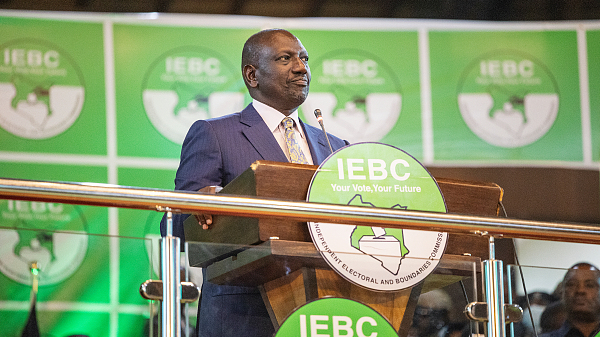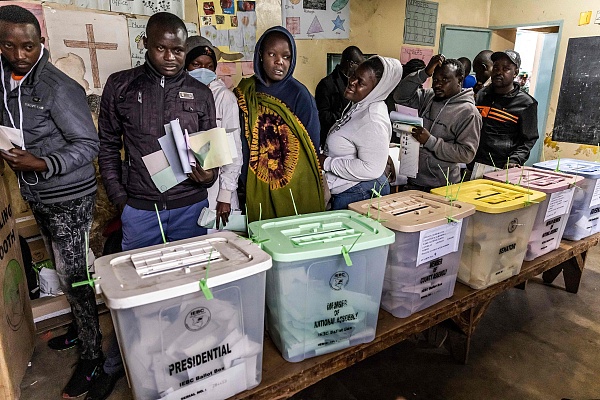
William Ruto, newly-elected president of Kenya, addresses the nation after the announcement of the election winner at the Independent Electoral and Boundaries Commission (IEBC) Center in Bomas in Nairobi, Kenya, August 15, 2022. /CFP
William Ruto, newly-elected president of Kenya, addresses the nation after the announcement of the election winner at the Independent Electoral and Boundaries Commission (IEBC) Center in Bomas in Nairobi, Kenya, August 15, 2022. /CFP
Editor's note: Stephen Ndegwa a PhD student in International Relations at the United States International University-Africa, and the Executive Director of South-South Dialogues, a Nairobi-based communication development think tank. The article reflects the author's opinions and not necessarily those of CGTN.
After a tight presidential race, Deputy President William Ruto has been declared the winner of Kenya's presidential election on August 15, narrowly beating his rival, Raila Odinga, with 50.5 percent of the vote, based on official data. For the better part of this year, hundreds of politicians have traversed the country or their respective constituencies, seeking votes for the various electoral offices up for grabs in the elections.
The six seats include the Presidency and County Governor, both of which have running mates. The other positions are Senator, Member of National Assembly, Member of County Assembly, and County Woman Member of National Assembly.
Kenya is still a maturing democracy. Naturally, it has teething political challenges, which have become accentuated during the peak of the five-year electoral cycle. However, every election is a learning process and helps to build resilience, tolerance and national cohesion among the country's 42 ethnic groups. Campaigns are increasingly becoming issue-based, which has helped citizens to focus on a candidate's ability to perform and deliver, rather than on his or her ethnic background.
From the foregoing, experts believe that regardless of who comes into power, China-Kenya relations will not veer off the current progressive path that they have already assumed since December, 2002 when the third President of Kenya Mwai Kibaki was sworn into office.
The renowned economist immediately rallied Kenyans to change the country's development paradigm and embrace development partners that were more practical and compassionate, fully cognizant that Kenya is a developing country that needs a lot of space, assistance and understanding to grow and achieve its full potential. Consequently, China's assistance entered Kenya in a big way, constructing some of the most iconic infrastructural projects in the East African country.
Kenya is China locked. Even the latter's worst critics at any level cannot deny the fact that Sino-Kenya relations have transformed the biggest economy in East and Central Africa within two decades, less than half the time when the country has been independent. This is the reason why no adverse mention of China's presence in the country was heard during the campaigns.

A group of voters queue while waiting to vote in front of ballot boxes at a polling station during Kenya's general election at St. Stephen School in the informal settlement of Mathare in Nairobi, Kenya, August 9, 2022. /CFP
A group of voters queue while waiting to vote in front of ballot boxes at a polling station during Kenya's general election at St. Stephen School in the informal settlement of Mathare in Nairobi, Kenya, August 9, 2022. /CFP
Kenyan politicians understand well that China is an integral part of their country's development process. Indeed, the status quo must remain for years to come for Kenya to continue on the upward trajectory.
The two are major trading partners, with trade growing exponentially every year. Data from the Kenya National Bureau of Statistics shows that Kenya imported nearly $4 billion of goods from China in 2021, and exported $1.5 billion worth of goods over the same period. Preferentially, Kenya has become the first African country to get approval for the export of its highly nutritious avocados to China. The first batch of the avocados was flagged off on August 2 at a ceremony attended by government officials and industry executives.
Virtually all areas in Kenya have felt the impact, with infrastructure as the point of reference. While Kenya has contracted Chinese firms to construct or rehabilitate major highways, counties, constituencies and even wards have also cooperated with these companies to make roads at the local level, which has raised the standards of living of the local people.
Even as outgoing Kenyan President Uhuru Kenyatta plans to hand over power to William Ruto, he has left many big projects around the country in various stages of completion. One of the biggest works in progress is the Lamu Port South Sudan – Ethiopia Transport Corridor Project, East Africa's largest infrastructure project.
Kenya's Big Four Agenda has enjoyed significant support from China. As the Eighth Ministerial Conference of the Forum on China-Africa Cooperation outlined, the two countries will continue to cooperate on both bilateral and global issues including peace and security, health, climate change, technology transfer and circular economy.
China has kept true to its promise of non-interference in the internal affairs of other countries. The furthest the country goes in commenting on its host's politics or other national affairs is to express best wishes for the occasion at hand. This mutual respect has been the backbone of the amiable Sino-Kenya relations. China's approach is to let things grow both systematically and organically, rather than coercing or unduly influencing events to suit their selfish interests.
In a telephone conversation with Kenya's Cabinet Secretary for Foreign Affairs Raychelle Omamo in June, Chinese State Councilor and Foreign Minister Wang Yi reiterated China's willingness to continue working closely with one of its major African bilateral partners. "China is ready to work with Kenya to firmly advocate and practice multilateralism, safeguard the common interest of developing countries, and uphold the basic norms governing international relations."
(If you want to contribute and have specific expertise, please contact us at opinions@cgtn.com. Follow @thouse_opinions on Twitter to discover the latest commentaries in the CGTN Opinion Section.)

